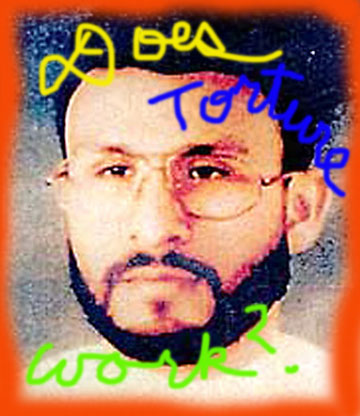
Ali Soufan was an FBI supervisory special agent from 1997 to 2005 and, together with another FBI agent, the primary interrogator of high ranking Al Quaeda terrorist, Abu Zubaydah, from March to June 2002—before the so-called enhanced techniques were used on Abu Zubaydah in August of that same year.
For seven years, he says, he has been silent about what he knows about the Bush Administration’s torture policies, except in closed Congressional hearings. But with the release of the torture memos Soufan is speaking out.
His Op Ed about “the false claims magnifying the effectiveness of the so-called enhanced interrogation techniques..” is in morning’s New York Times. Reading it is a necessity.
Here are some clips:
One of the most striking parts of the memos is the false premises on which they are based. The first, dated August 2002, grants authorization to use harsh interrogation techniques on a high-ranking terrorist, Abu Zubaydah, on the grounds that previous methods hadn’t been working. The next three memos cite the successes of those methods as a justification for their continued use.
It is inaccurate, however, to say that Abu Zubaydah had been uncooperative. Along with another F.B.I. agent, and with several C.I.A. officers present, I questioned him from March to June 2002, before the harsh techniques were introduced later in August. Under traditional interrogation methods, he provided us with important actionable intelligence.
We discovered, for example, that Khalid Shaikh Mohammed was the mastermind of the 9/11 attacks. Abu Zubaydah also told us about Jose Padilla, the so-called dirty bomber. This experience fit what I had found throughout my counterterrorism career: traditional interrogation techniques are successful in identifying operatives, uncovering plots and saving lives.
There was no actionable intelligence gained from using enhanced interrogation techniques on Abu Zubaydah that wasn’t, or couldn’t have been, gained from regular tactics…
Interestingly, Soufan says that his CIA colleagues who actually did the torturing, were not in favor of it:
Almost all the agency officials I worked with on these issues were good people who felt as I did about the use of enhanced techniques: it is un-American, ineffective and harmful to our national security.
By the way, Soufin is uniquely equipped to know the importance of interrogation: He was the Arab-speaking FBI agent who journalist Lawrence Wright feels might have stopped the 9/11 plot from occurring if turf wars with the CIA had not gotten in the way.
****************************************
Also, be sure to read the column in Foreign Policy by Philip Zelikow, the executive director for the 9/11 Commission and a former aide to Condoleezza Rice.

Soon after his capture, Zubaydah was described as “insane, certifiable, a split personality† an opinion, that was shared by the CIA’s top brass.
After extreme methods were used, a CIA interrogator decided to try a psychological approach, in which he talked to Zubaydah about the Koran.
This good guy questioning with the threat of bad guy questioning eventually led to the arrest of Khalid Sheikh Mohammed, who was the principle architect in the attacks of September 11.
Khalid Sheikh Mohammed (KSM), the man responsible the murder of over 2000 Americans was water-boarded 183 times
“He was strapped down to the water-board, he felt humiliated – not by the treatment but by the fact that a woman, a red-headed CIA supervisor, was allowed to witness the spectacleâ€Â, said a former intelligence officer.
A current CIA official says that Khalid Sheikh Mohammed actually told interrogators the only reason he confessed was because of the water-boarding.
But what if that water-boarding of KSM had not occurred? It is a question at the center of the debate, the debate over a technique has not been used in 5 years.
Would the agency have eventually worn KSM down? Would the confessions have poured forth about Daniel Pearl’s beheading, about his role in the 1995 plot by his nephew, master bomber Ramzi Yousef, to assassinate Pope John Paul II during a visit to Manila, and detailed information about his role as mastermind of the Sept. 11 attacks?
One of the al-Qaeda operatives identified by Mohammed is Adman G. El Shukrijumah, a 27-year-old Saudi who went to college in South Florida.
In 2003, Shukrijumah was purportedly to be working at a FIVE megawatt nuclear research reactor at McMaster University (the largest in Canada).
In March 2004, Shukrijumah was seen at an Al Qaeda summit in Waziristan, where he reportedly had footage of potential targets in Washington, DC and New York, including the New York financial district, the World Bank and the IMF. Shukrijumah had traveled extensively throughout the U.S prior to 9/11.
After 9-11, Shukrijumah was singled out by bin Laden to spearhead the next attack on America — a nuclear attack that would take place simultaneously in seven U.S. cities (New York, Boston, Miami, Houston, Los Angeles, Las Vegas, and Washington D.C.), killing millions.
http://en.wikipedia.org/wiki/Khalid_Shaikh_Mohammed
http://en.wikipedia.org/wiki/Adnan_Gulshair_el_Shukrijumah